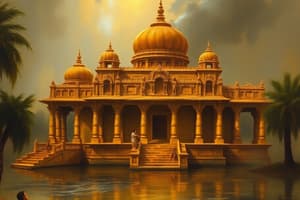Podcast
Questions and Answers
చుల్లకళింగ జాతకం ప్రకారం కళింగ రాజును ఓడించన అస్క్మక రాజుగా చెప్పబడుతున్న శాతవాహన రాజు ఎవరు?
చుల్లకళింగ జాతకం ప్రకారం కళింగ రాజును ఓడించన అస్క్మక రాజుగా చెప్పబడుతున్న శాతవాహన రాజు ఎవరు?
- గౌతమీపుత్ర శాతకర్ణి
- మొదటి శాతకర్ణి (correct)
- యజ్ఞశ్రీ శాతకర్ణి
- కుంతల శాతకర్ణి
What was the material primarily used to make Satavahana coins?
What was the material primarily used to make Satavahana coins?
- Copper and zinc
- Lead, copper, and potin (correct)
- Iron and bronze
- Gold and silver
What was the inspiration for the Satavahana coinage system?
What was the inspiration for the Satavahana coinage system?
- Roman coinage system
- Greek coinage system
- Mauryan punch-marked coinage (correct)
- Chinese coinage system
What is depicted on one side of Satavahana coins?
What is depicted on one side of Satavahana coins?
What script was used for inscriptions on Satavahana coins?
What script was used for inscriptions on Satavahana coins?
What is the most famous example of Satavahana architecture?
What is the most famous example of Satavahana architecture?
What is the primary material used in Satavahana architecture?
What is the primary material used in Satavahana architecture?
What is depicted in the carvings on the Amaravati Stupa?
What is depicted in the carvings on the Amaravati Stupa?
During whose reign was the Amaravati Stupa likely built?
During whose reign was the Amaravati Stupa likely built?
Who founded the Sathavahana dynasty?
Who founded the Sathavahana dynasty?
What was a significant part of the Satavahana economy?
What was a significant part of the Satavahana economy?
What type of government structure did the Satavahana administration have?
What type of government structure did the Satavahana administration have?
Which religion did the Satavahanas predominantly support?
Which religion did the Satavahanas predominantly support?
What led to the decline of the Sathavahana dynasty?
What led to the decline of the Sathavahana dynasty?
Which dynasty replaced the Satavahanas in the 3rd century CE?
Which dynasty replaced the Satavahanas in the 3rd century CE?
What was one of the major exports of the Satavahana dynasty?
What was one of the major exports of the Satavahana dynasty?
Which sector did the Satavahanas promote that contributed to the development of education and art?
Which sector did the Satavahanas promote that contributed to the development of education and art?
Flashcards are hidden until you start studying
Study Notes
Coinage
- Satavahana dynasty issued a large number of coins made of lead, copper, and potin (a alloy of silver, copper, and tin).
- Coinage system was based on the punch-marked coinage of the Mauryan period with some modifications.
- Coins typically featured a depiction of the sun, moon, and stars on one side, and a symbol or legend on the other.
- Some coins featured portraits of Satavahana rulers, providing information about their appearance and identity.
- Inscriptions on the coins were in the Brahmi script and Prakrit language, evidence of linguistic and cultural diversity.
Architecture
- Satavahana dynasty is known for its unique architectural style, blending local and Buddhist influences.
- Amaravati Stupa, located in present-day Andhra Pradesh, is the most famous example of Satavahana architecture.
- Amaravati Stupa is a large, cylindrical structure built using limestone and decorated with intricate carvings.
- Carvings depict scenes from the life of the Buddha, mythological creatures, and floral motifs.
- Stupa was likely built during the reign of Satavahana king Gautamiputra Satakarni (c. 2nd century CE).
- Other notable examples of Satavahana architecture include the Guntupalli group of Buddhist monuments and the Nagarjunakonda valley.
- Satavahana architecture is characterized by the use of limestone, sculptural decorations, and a focus on Buddhist themes and motifs.
Sathavahana Dynasty
Origin And Rise
- Founded by Simuka, a Brahmin from Pratishthana (modern-day Paithan in Maharashtra) in 230 BCE
- Initially ruled over a small region in modern-day Maharashtra
- Gradually expanded territory through military conquests
- Played a significant role in the history of India, particularly in the Deccan region
Economic Conditions
- Economy primarily based on agriculture, with crops like rice, wheat, and cotton
- Trade relations with the Romans, exporting spices, textiles, and precious stones
- Issued own coins made of silver and copper, featuring symbols like the elephant and the lion
- Patronized Buddhist and Brahminical institutions, contributing to education, art, and architecture
Administration And Religion
- Administration divided into three tiers: central, provincial, and local
- King was the supreme authority, assisted by ministers and officials
- Patrons of Buddhism, supporting many Buddhist monks and scholars
- Supported Brahminical institutions, with Vedic religion as an essential part of administration
Decline And Legacy
- Declined in the 3rd century CE due to internal conflicts, wars, and rise of new powers
- Replaced by the Vakataka dynasty in the 3rd century CE
- Left a lasting legacy in art, architecture, literature, and trade
- Played a significant role in the spread of Buddhism and development of Indian culture in the Deccan region
Studying That Suits You
Use AI to generate personalized quizzes and flashcards to suit your learning preferences.


